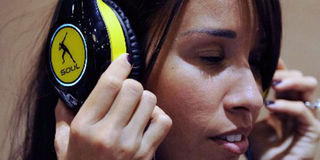How headphones steal your hearing

A woman wears a pair of Soul SL300 noise-cancelling headphones at a press event at the Mandalay Bay Convention Center in Las Vegas in the US for the 2013 International Consumer Electronics Show on January 6, 2013. PHOTO | DAVID BECKER | AFP
What you need to know:
- Quite often, loud music listened through headphones is used to try to mask city noise such as traffic, factory or construction.
- Instead of solving the problem, it just creates more problems as the majority of earbuds and headphones aren’t designed to block out ambient noise.
In the 1980s, audiologists began cautioning lovers of loud music about hearing loss that could potentially result from use of their Walkman or portable compact disc players. More than 30 years later, the integration of portable digital devices that play music are more abundant than almost every other electronic device in the world, and all of them have an earphone jack.
Earbuds are primarily used to listen to music, and little thought is given to the amount of time worn, or level of volume. It’s not unusual for people to listen to music or the radio at high volumes for several hours in a day. Experts warn that continued use of earphones or earbuds over prolonged period of time, especially if the earphones are of poor quality, can lead to hearing loss.
Last year, the World Health Organization warned that 1.1 billion young people were at risk of hearing loss because of personal audio devices such as smartphones, and damaging levels of sound at entertainment venues like electronic dance music festivals, where noise levels can top 120 decibels for hours.
Other studies have shown that today, one in five teens has some form of hearing loss – a rate about 30 per cent higher than it was in the 1980s and 1990s – which many experts believe is due, in part, to the increased use of headphones.
Noisy urban environments compound the risk of hearing damage. Quite often, loud music listened through headphones is used to try to mask city noise such as traffic, factory or construction. But instead of solving the problem, it just creates more problems as the majority of earbuds and headphones aren’t designed to block out ambient noise.
And because headphones and earbuds don’t mask the external noise, most people are inclined to turn their music volume way up, past safe listening levels.
Low quality headphones are less effective in transmitting low-frequency bass; this causes the listener to crank up the volume to hear the music better. But when the music is turned up so that the low-frequency bass is clearer, the volume of high-frequency sounds is raised as well.
And it is the high-frequency sounds that are most damaging to the cilia, the tiny hair-like structures that help carry sound waves to the brain. Once the cilia are damaged, they begin to die, and unfortunately they don’t regenerate.
Cellphones and smartphones aren’t going away, but there are a few things you can do to protect your hearing. Experts recommend keeping your cell phone away from your ear as much as possible by texting, using the speaker phone or using a Bluetooth headset. If you have to hold the phone up to your ear, keep the calls short. And instead of using a cell phone, use a landline if one happens to be available.
Higher quality earbuds or headphones that transmit the low-frequency bass more effectively are a good option. Noise cancelling headphones, though expensive, can be an effective solution in urban environments where loud noises are a problem.
Also, wear earmuff – style headphones. Your best bet is “noise-cancelling” headphones, which reduce or eliminate background noise. This lessens the need to crank the volume above 50 per cent. You can listen to music at a softer volume, for a longer time.
Above all, you want to avoid what is known as “volume creep”, or the need to gradually increase the volume in order to maintain the same sensation you felt when you first started listening.
Phone technology can be a great thing, but educating yourself about its hearing dangers can go a long way toward protecting your hearing both now and in the future. In order to better understand your hearing, the starting point would be to find a hearing healthcare professional to further discuss your options.
Wambugu is an informatics specialist; [email protected]; @samwambugu2.





